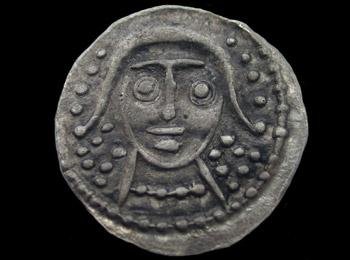Archaeologists have unearthed dozens of sceats, or Middle Saxon coins, at the island settlement dig sites. Photo by University of Sheffield
LITTLE CARLTON, England, March 2 (UPI) -- The discovery of an ancient Anglo-Saxon island settlement in Little Carlton near Louth, Lincolnshire, began with the odd discovery of a silver stylus in the middle of a field and quickly turned into a major archaeological excavation
The stylus was initially found by local metal detectorist Graham Vickers, who reported his discovery to local antiquities officials. Soon after, archaeologists from the University of Sheffield were called into assist.
So far, 21 styli, some 300 dress pins and dozens of coins known as sceats have been unearthed, all dated to the 7th and 8th centuries.
"Our findings have demonstrated that this is a site of international importance, but its discovery and initial interpretation has only been possible through engaging with a responsible local metal detectorist who reported their finds to the Portable Antiquities Scheme," archaeologist Hugh Willmott explained in a news release.
The site of interest is today buried beneath a field, but at the time of the Middle Saxon settlement, water levels in the region were much higher -- as were portions of the land. Geophysical surveys and 3D modeling suggest the settlement sat high above surrounding marshes.
It was island of sorts, perhaps serving as a monastic or trading center.
The ongoing excavations have unearthed what appears to be an industrial work site. In addition to styli and coins, archaeologists have found sizable quantities of pottery and butchered animal bone.
"It's been an honor to be invited to work on such a unique site and demonstrate the importance of working with local people on the ground; one of the greatest strengths of the University of Sheffield is its active promotion of an understanding of our shared pasts for all concerned," concluded Willmott.















